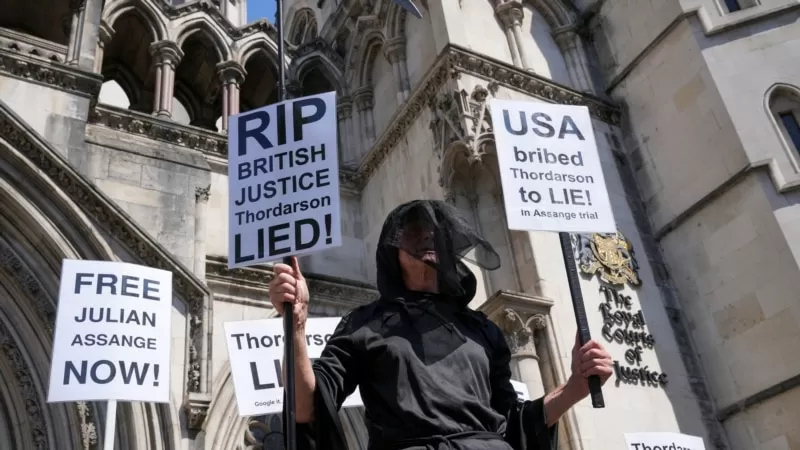London – In a recent ruling, a British court has granted WikiLeaks founder Julian Assange the right to appeal against an extradition order to the United States on espionage charges. This decision by two High Court judges has set the stage for a lengthy legal battle, further prolonging the already years-long saga surrounding Assange’s case.
Assange, an Australian computer expert, has been at the center of controversy for almost 15 years, ever since his website published a trove of classified U.S. documents. He has spent the last five years in a high-security prison in the UK, after seeking refuge in the Ecuadorian Embassy in London for seven years.
The ruling by the High Court comes after Assange’s lawyers argued that he was a journalist who exposed U.S. military wrongdoing in Iraq and Afghanistan. They also claimed that his extradition to the U.S. would result in a politically motivated prosecution and a “flagrant denial of justice.”
On the other hand, the U.S. government has accused Assange of going beyond the role of a journalist and engaging in activities such as soliciting, stealing, and indiscriminately publishing classified government documents. The U.S. has charged him with 17 counts of espionage and one count of computer misuse.
In March, two judges rejected most of Assange’s arguments but allowed him to take his case to the Court of Appeal, provided the U.S. government guaranteed that he would not face the death penalty and would have the same free speech protections as a U.S. citizen.
The U.S. government did provide these reassurances, but Assange’s legal team and supporters argue that they are not sufficient to ensure a fair trial in the U.S. federal court system. They believe that the First Amendment promises made by the U.S. fall short in protecting Assange’s rights. The U.S. has stated that Assange could rely on the First Amendment, but it would ultimately be up to a judge to decide whether he could do so.
During the court proceedings, James Lewis, the attorney representing the U.S., argued that Assange’s actions were not protected by the First Amendment. He stated, “No one, whether they are U.S. citizens or foreign citizens, can rely on the First Amendment when it comes to publishing illegally obtained national defense information that puts innocent sources at grave and imminent risk of harm.”
Assange, who has been in a British prison for the past five years, was not present in court to hear the ruling. His lawyer, Edward Fitzgerald, stated that he was unable to attend due to health reasons.
Outside the courthouse, scores of supporters gathered, holding signs and chanting slogans in support of Assange. One large banner aimed at President Joe Biden read, “Let him go Joe,” while another stated, “Publishing is not a crime. War crimes are.” The supporters believe that Assange’s actions were in the public interest and that he should not be punished for exposing the truth.
Assange’s family and supporters have expressed concern over his physical and mental health, which they say has deteriorated during his decade-long legal battle. This includes the seven years he spent inside the Ecuadorian Embassy in London from 2012 to 2019. They fear that he could face up to 175 years in prison if convicted, although U.S. authorities have stated that any sentence would likely be much shorter.
Assange’s legal team is prepared to take the case to the European Court of Human Rights if necessary. However, his supporters are worried that he could be extradited to the U.S. before the court in Strasbourg, France, can intervene.
The judges in the High Court, Victoria Sharp and Jeremy Johnson, may also postpone issuing a decision on the case. This would further prolong the legal battle and add to the uncertainty surrounding Assange’s fate.
In conclusion, the recent ruling by the British High Court granting Julian Assange the right to appeal against his extradition to the U.S. is a significant development in this long-standing legal battle. It gives hope to Assange and his supporters that justice will prevail and that he will not be punished for his actions as a journalist. The decision also highlights the importance of protecting free speech and media freedoms, both in the U.S. and around the world. Let us hope that the appeal process will bring about a fair and just resolution for all parties involved.

